"The underlying pattern is of an outsider. Scorsese is uninterested in conventional heroes."
A critical friendship between those who respect one another's creative work is a gift for those who eavesdrop. Insight into how a friendship between Sol Stein and James Baldwin nurtured Baldwin's Notes of a Native Son into existence or Toni Morrison’s imagined conversation with Martin Luther King. We are all elevated by their inspiration.
The multi-decade friendship - "long-standing but not intimate" - between film critic Roger Ebert (June 18, 1942 - April 4, 2013) and filmmaker Martin Scorsese (born November 17, 1942) existed at a sub-aesthetic level. Ebert's Scorsese, by Ebert, is a compilation of Ebert's original reviews - unedited or updated- and reconsiderations of Scorsese's most successful and critically acclaimed films. It is a thoughtful, precise, vulnerable perspective on Scorsese's contributions to the primary art form of the 20th century.
It also tells us a lot about Ebert.
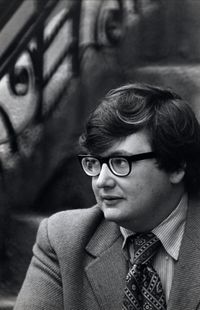 Roger Ebert.
Roger Ebert.Although the two did not meet in person until 1969 ("[Marty] was one of the most intense people I'd ever known"), Ebert cut his teeth as a film critic when he reviewed Scorsese's first movie in 1967:
I had been a film critic for seven months when I saw his first film in 1967, entitled Who's That Knocking At My Door? Everything about that movie stabbed me in the heart and soul. I had seen great films; I had seen more fantastic films, but never one that so touched me. Perhaps it was because of that experience that I became a film critic, instead of simply working as one. I describe these feelings not because you are interested in me, but because I am interested in why I feel a lasting bond with this director."
Although their backgrounds and lives differed, both men had a baseline of what it meant to be raised Catholic by American immigrant families. "Roger saw something in it most people did not," Scorsese wrote of Ebert's first review.
Scorsese continues in the book's introduction:
He made a personal connection with it based on the fact that we were both marked by our relationship with the Catholic Church, in which we had both been raised. He was the Irish church, mine, the Italian. But we had both, at one point in our young lives, aspired to a priestly vocation, and we had both failed in that ambition.
The power of the Catholic Church in Scorsese's life ultimately played out as a power structure in many of his films. A force of power and strength against which his anti-heroes fought, exploded, and ultimately withered.
Ebert writes:
The underlying pattern is of an outsider. Scorsese is uninterested in conventional heroes. He often tells the story about sitting in his family's apartment in Little Italy and watching through the window as gangsters came and went at the social club across the street. Some of those moments are reflected in the opening scenes of GoodFellas. Scorsese's protagonists are not the guys with the shiny cars, although they are common enough in his movies. His identification is the kid in the window.
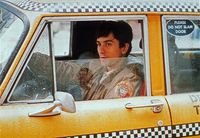 Robert De Niro as Travis Bickle in Taxi Driver, 1976.
Robert De Niro as Travis Bickle in Taxi Driver, 1976.Taxi Driver, Scorsese's 1976 film about a veteran, misfit, falsely masculine, desperately broken Travis Bickle, is this outsider at its psychotic extreme. In his original film review, Ebert notices a powerful shot when the camera looks away while the character is being rejected by a girl as if to give him respect. And yet we see brutal face-on filming during the same character's shooting spree.
That Scorsese finds the rejection more painful than the murders is fascinating because it helps explain Travis Bickle, and perhaps it goes some way toward explaining one kind of urban violence. Travis has been shut out so systematically, so often, from a piece of the action that eventually he has to hit back somehow.
"Give me a song I can feel, and it's never work," wrote Billie Holiday in her heartbreaking memoirs, a marginalized victim of that same violence. Ebert often said that when he does not understand a movie intellectually, he focuses on how it makes him feel. His connection to Scorsese's work was a deep appreciation of the director's technical talent and a sub-aesthetic feeling, a continuation of the initial 'stab in the heart and soul.' They shared a religion, but they also shared something far more personal.
At some point in the later 1970s, Scorsese, like so many of his contemporaries, began using cocaine. The drug had become almost commonplace in Hollywood...As an interviewer or critic, I have avoided gossip about my subjects, and I would not mention this detail about Scorsese if t were not wildly known, and he had not told me about it after he was securely clean and sober. In 1978, toward the end of his period of usage, he overdosed, which resulted in a trip to the emergency room and a hospital stay.
"In AA," I said, they say you have to find bottom, your own personal bottom before you can get sober."
"I almost died," he told me. "I would consider that my personal bottom."
At the insistence of Robert De Niro, who visited Scorsese in the hospital, the director made his next project, Raging Bull, the life story and personal demons of Jake La Motta, a real-life middleweight boxer whose life and talent were subverted by insecurity and self-destruction. The film's unforgettable opening sequence, replete with animal noise sound effects and slow-motion, juicy flesh-wobbling punches, shows us in seconds the physical and mental limits of De Niro as this self-hating pugilist.
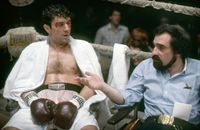 Robert De Niro and Martin Scorsese on the set of Raging Bull, 1981.
Robert De Niro and Martin Scorsese on the set of Raging Bull, 1981.This movie is about a man battling who he is and who he thinks he should be. As Ebert reminds us, the film was made by a recently-clean drug addict struggling with his demons.
A year after Scorsese was released from the hospital and began to get clean, Ebert found himself doing the same.
In August 1979, I took my last drink. It was about four o'clock on a Saturday afternoon, the hot sun streaming through the windows of my little carriage house behind the Four Farthings on Dickens. I put a glass of scotch and soda down on the living room table, went to bed, and pulled the blankets over my head. I couldn't take it anymore. That afternoon after I pulled the covers over my head, I stayed in bed for thirteen hours. On the Sunday I poured out the rest of the drink, which at the time, I had no idea would be my last.
From Roger Ebert's Life, Itself
"Drinking had melted my solitary shyness and replaced it with shallow bravado," Ebert admitted. When Ebert noted that Scorsese's films were based on the concept of an outsider, it was because Ebert knew what that outsider was.
In 1956, a young Englishman, Colin Wilson, wrote a book called The Outsider, which reset our understanding of an outsider as a misunderstood identity. The book has fallen out of favor due to its gross representation of mental illness as a social construct (Wilson looked at Van Gogh and schizophrenic Russian ballet dancer Vaslav Nijinsky.) However, his demand that we view one another with empathy, not fear, was unique and merits mention.
There is a passage in Ebert's memoirs where he identifies as this outsider:
In Venice, there is a small bridge leading over a side canal. Halfway up the steps crossing the bridge, there is a landing, and a little cafe has found a perch there. In front of this cafe, there is one table with two chairs. [...] Of course, you must have a newspaper, a book, a sketchpad—anything that seems to absorb you. If you are simply sitting there, you will appear to be a Lonely Person, and people will look away from you. I do not sit there for the purpose of people-watching. I am engaged in the pastime of Being By Myself in a City Where No One Knows Who I Am And No One Knows Where to Find Me.
From Roger Ebert's Life, Itself
He does not fit in, per se, but equally, in this protective anonymity, he is not not fitting in. Solitude carries bejeweled rewards and a pernicious side that percolates when left too long. The kid at the window always feels like the kid at the window, even as an adult. Scorsese put this archetype in his films - Bickle, Jake LaMotta, and Joe Pesci's doomed character Tommy DeVito in Goodfellas. Ebert identified with it.
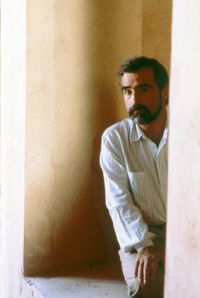 Martin Scorsese on the set of The Last Temptation of Christ, 1988.
Martin Scorsese on the set of The Last Temptation of Christ, 1988.Suppose I were to consider the collective work of these two men, I'd return to something Ebert admitted: "Most alcoholics continue to drink as long as they can...alcoholics continue for what remains of your life, barring an accident. The lucky ones find their bottom and surrender."
I belong to this imagined outsider club and have said elsewhere that Ebert is the reason I am a writer: his confident yet emphatic self-expression in the first-person, technical grasp of the short-form essay, and his absolute love and respect for what he did, 'vocation,' he called it. I don't have substance abuse issues, but I have reached my personal bottom and know what it is like to choose life. And have to keep choosing life as the day's salutation.
Martin Scorsese's films tackle the intellectual and social monopoly of masculine power, religion-proscribed values, and brutality of a highly structured criminal world. He also gave us characters who scraped their bottom - in homicide (Bickle), alcohol and loneliness (La Motta), or simply death (Pesci's DeVito) - but never surrendered to it.
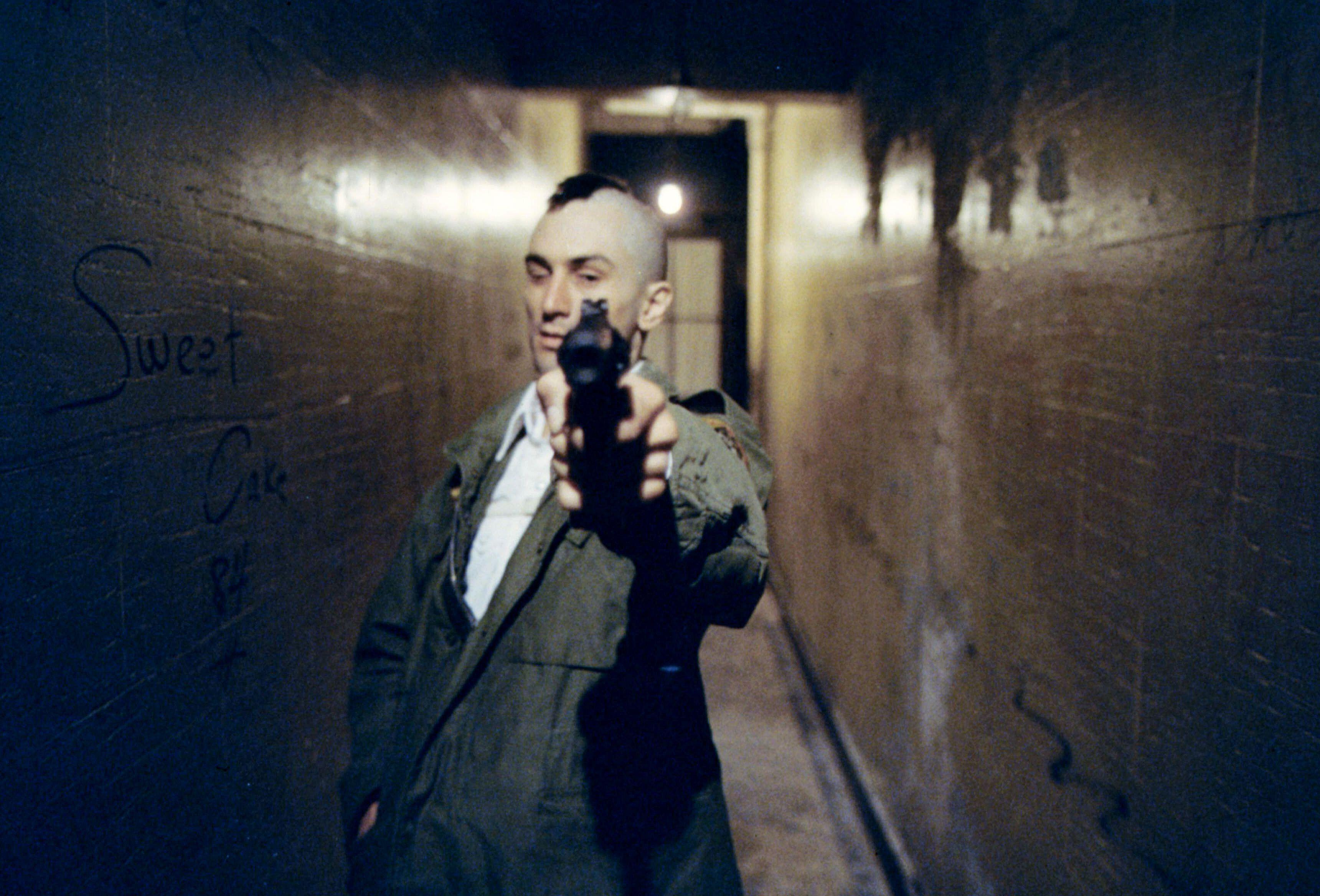 Robert De Niro as Travis Bickle in Taxi, 1976.
Robert De Niro as Travis Bickle in Taxi, 1976.It is challenging and humbling to crawl around the vicious depths of the self. Still, when you find an artist inhabiting that space who, through some alchemic mastery, renders it into some shape of beauty, it means something grander than aesthetics, deeper than language. It stabs the heart and soul.
Scorsese turned eighty in 2022 and is still making films. Ebert died in 2013 after losing his lower jaw, throat, and, ultimately, life to cancer. Scorsese directed and released The Irishman in 2019. I haven't seen it. I realize as I write I stopped watching movies when Ebert died. Not intentionally; it just happened. Maybe I think it is somehow wrong to watch movies without him. Or worse, it is just too lonely.
In an imagined conversation with Martin Luther King, Toni Morrison wondered if Reverend King would have been proud of her. I wonder what Ebert would have thought of Scorsese's film and any Scorsese has yet to make. Moreover, I wonder if Scorsese wondered what Ebert would have thought and if he would have been proud. I think so. "Since that first day, Scorsese has never disappointed me," Ebert wrote of his friend, "He has never made an unworthy film."

